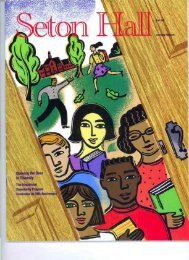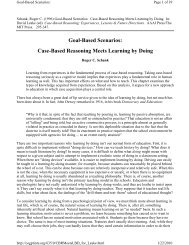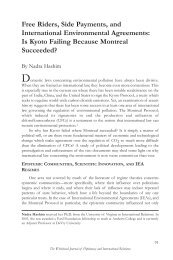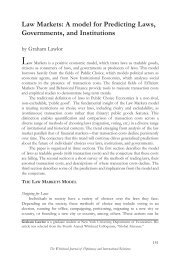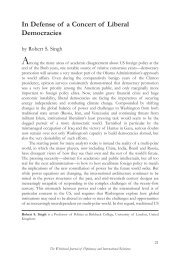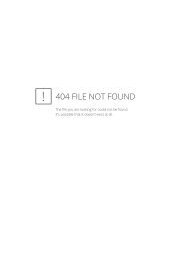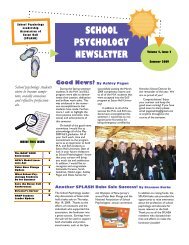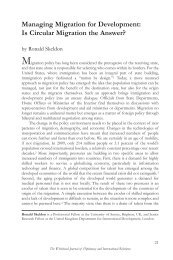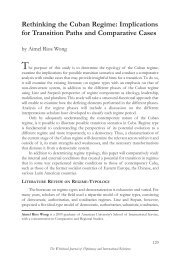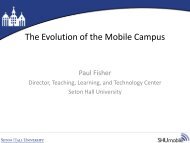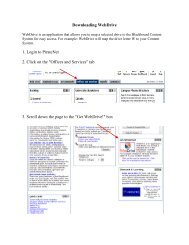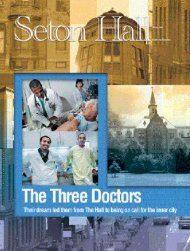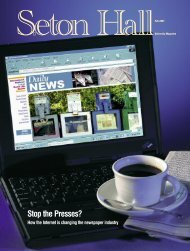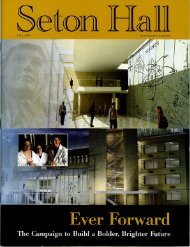Seton Hall Magazine, Winter 2000 - Seton Hall University
Seton Hall Magazine, Winter 2000 - Seton Hall University
Seton Hall Magazine, Winter 2000 - Seton Hall University
You also want an ePaper? Increase the reach of your titles
YUMPU automatically turns print PDFs into web optimized ePapers that Google loves.
F r e e d o m a n d H u m a n R i g h t s<br />
Aswe enter the new millennium,<br />
the promotion of human rights<br />
as basic laws for the international<br />
order will advance human freedom<br />
to achieve greater mutual cooperation<br />
between peoples, in the advancement<br />
of technology, knowledge and decent<br />
living. However, such a prospect<br />
can only be realized once humanity<br />
acknowledges that freedom represents<br />
a dynamic opportunity for growth and<br />
transformation. One is not only free from<br />
threats, persecution, bias, enslavement<br />
and imprisonment or war that come to<br />
restrict life. One can<br />
become truly free for<br />
self-realization as an<br />
individual mortal<br />
creature in relation<br />
to others. One gains<br />
freedom as one transcends<br />
his/her life<br />
moments by a<br />
deeper awareness,<br />
spiritual satisfac-<br />
“In the Biblical view, tion and personal<br />
God displays his lov- fulfillment.<br />
ing kindness on cre- Freedom is the<br />
ation and wills it to be greatest value that<br />
good. The human<br />
the Bible posits for<br />
humanity, already in<br />
being can seek and<br />
its opening chapter<br />
strive for the same on “Creation.” Such<br />
display of loving kind- a view was unique<br />
ness and goodness.” and revolutionary in<br />
Biblical times, but<br />
in our day it is proclaimed<br />
as necessary and an absolute<br />
principle. Over the past 2,000 years,<br />
the Western world was gradually transformed<br />
by the Bible. The Jewish-<br />
Christian teachings predicate human<br />
freedom not on a relativistic humanism<br />
but on a personal faith in and dependence<br />
upon God the Creator. The<br />
individual is a unique creature only<br />
because he/she enjoys the “image”<br />
of his Maker. Both genders are equal<br />
before the Creator. Adam is created<br />
as a single human being to teach<br />
28 SETON HALL UNIVERSITY MAGAZINE<br />
The Biblical Perspective on Choosing<br />
a Wholesome Way of Life<br />
BY RABBI ASHER FINKEL, PH.D.<br />
paradigmatically that each individual<br />
is an entire world, the focus of God’s<br />
creative will. This principle of human<br />
equality and singular significance determines<br />
freedom. Each person enjoys<br />
the qualitative distinction to be free as<br />
his/her Maker is free. The human being<br />
is a co-partner with God following creation<br />
and assumes full responsibility for<br />
his/her actions. In the Biblical view, God<br />
displays his loving kindness on creation<br />
and wills it to be good. The human<br />
being can seek and strive for the same<br />
display of loving kindness and goodness.<br />
The person emulates God’s<br />
example in the Biblical presentation<br />
that offers the absolute standard. To be<br />
free is to choose this way of life voluntarily<br />
for the betterment of this world.<br />
The historical event of Exodus from<br />
Egypt becomes the focus of transformative<br />
consciousness. The person is free<br />
from subjugation to human dictatorship<br />
of the Pharaonic god-king and its<br />
mythopoeic thought of nature worship.<br />
The Bible early on anchors human<br />
awareness of God’s presence in the historical<br />
event of a nation of slaves becoming<br />
free to live with dignity, in the<br />
“image” of their Maker. The people can<br />
be transformed to receive a Decalogue<br />
which stipulates human rights as basic<br />
laws. The second tablet of the Law<br />
opens with the right to life, which<br />
negates unconditionally the shedding of<br />
blood. Then the other rights are listed:<br />
the right to marriage and family, the<br />
right to possessions and profession, the<br />
right to fair trial and protection from<br />
licentious confiscation.<br />
In modern times, René Cassin was<br />
chiefly responsible for the formulation of<br />
the “Universal Declaration of Human<br />
Rights,” which was approved by the<br />
General Assembly of the United<br />
Nations on December 10, 1948. He<br />
located its ideological roots with the<br />
Decalogue, but he avoided reference to<br />
God as the normative source. For the<br />
first Tablet of the Law formulates<br />
axiomatically a key statement that<br />
comes to revolutionize human consciousness.<br />
In counterdistinction to<br />
nature worship, it stipulates “I am the<br />
Lord your God, who took you out of<br />
Egypt, out of the land of bondage”<br />
(Exodus 20:2). The reality of the wholly<br />
Other, who is totally free to act in his<br />
creation, can be acknowledged fully by<br />
a person who is released from physical,<br />
mental and spiritual bondage. People<br />
can be transformed when their freedom<br />
is experienced on the cognitive submission<br />
only to the ultimate Reality.<br />
Civilizations rise and fall by means<br />
of power and war. However, the Biblical<br />
goal of human achievement is “shalom”<br />
(Proverbs 3:17). This signifies wholesomeness<br />
in human relations: person to<br />
God, person to person, person to nonperson,<br />
i.e. nature, and person to self.<br />
In the interrelated understanding of<br />
such harmonious living, all these experiential<br />
relations speak of value in a<br />
moral order. The mediating values of<br />
the polarized experience in all these<br />
areas capture the Creator’s expression<br />
for human wholesomeness.<br />
Building on the great achievement of<br />
democratic society in the promotion of<br />
freedom and human rights, we are asked<br />
to advance educationally towards wholesome<br />
living that acknowledges ultimate<br />
authority of our Creator in human conduct.<br />
The prophet Isaiah depicts the<br />
final prospect of genuine human freedom<br />
as a serene setting of beasts<br />
dwelling peacefully with domesticated<br />
animals, while a mere child can lead<br />
them. No harm and no destructive force<br />
threaten humanity anymore, as it<br />
becomes free to be “filled with the<br />
knowledge of the Lord, as the waters<br />
cover the sea” (Isaiah 11:9).<br />
Rabbi Asher Finkel, Ph.D.,<br />
is chair of the Graduate<br />
Department of Jewish-Christian<br />
Studies in the College of Arts<br />
and Sciences.



